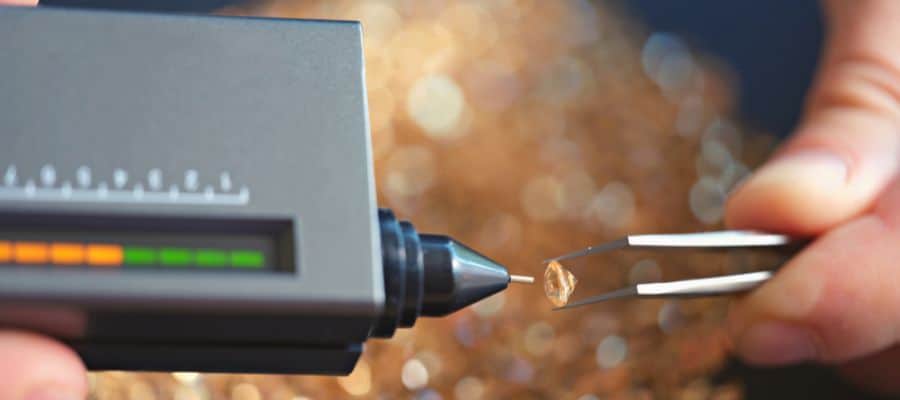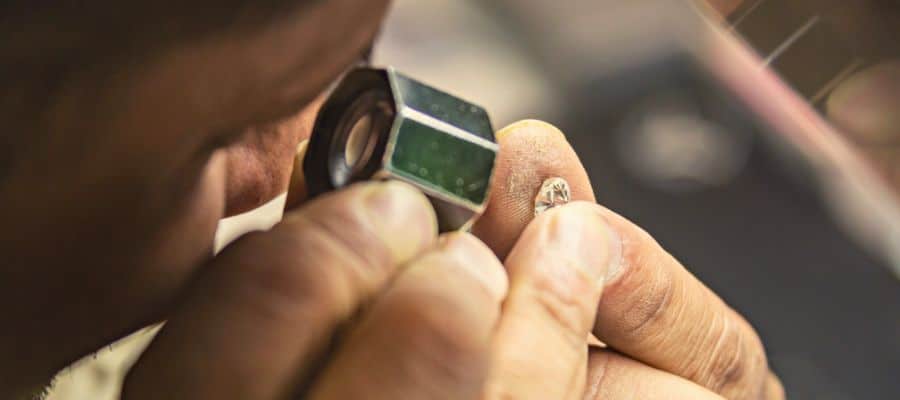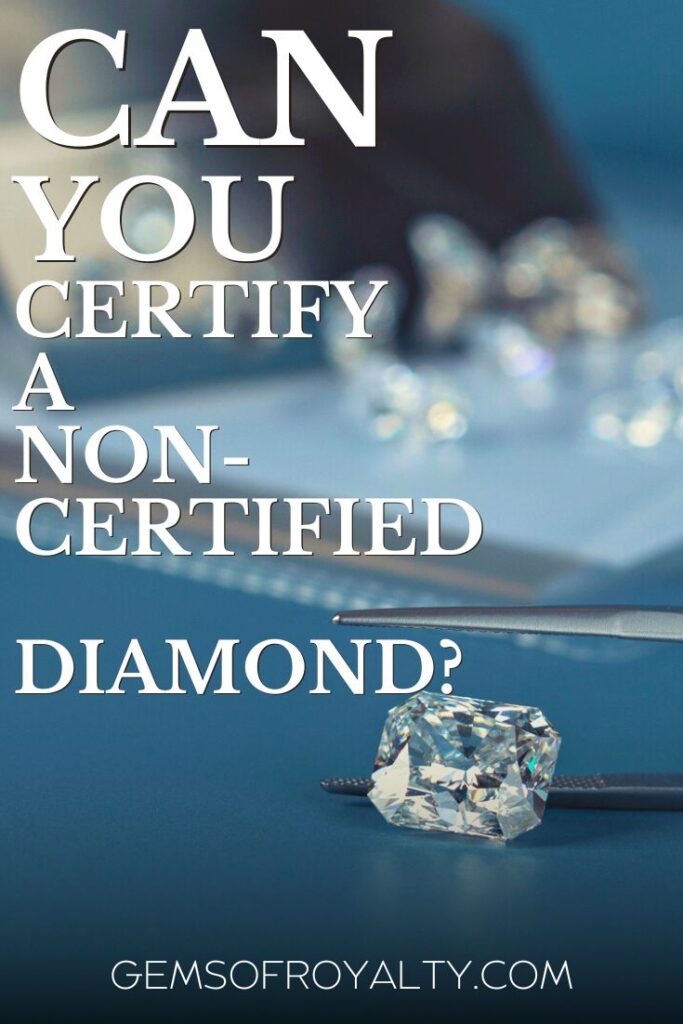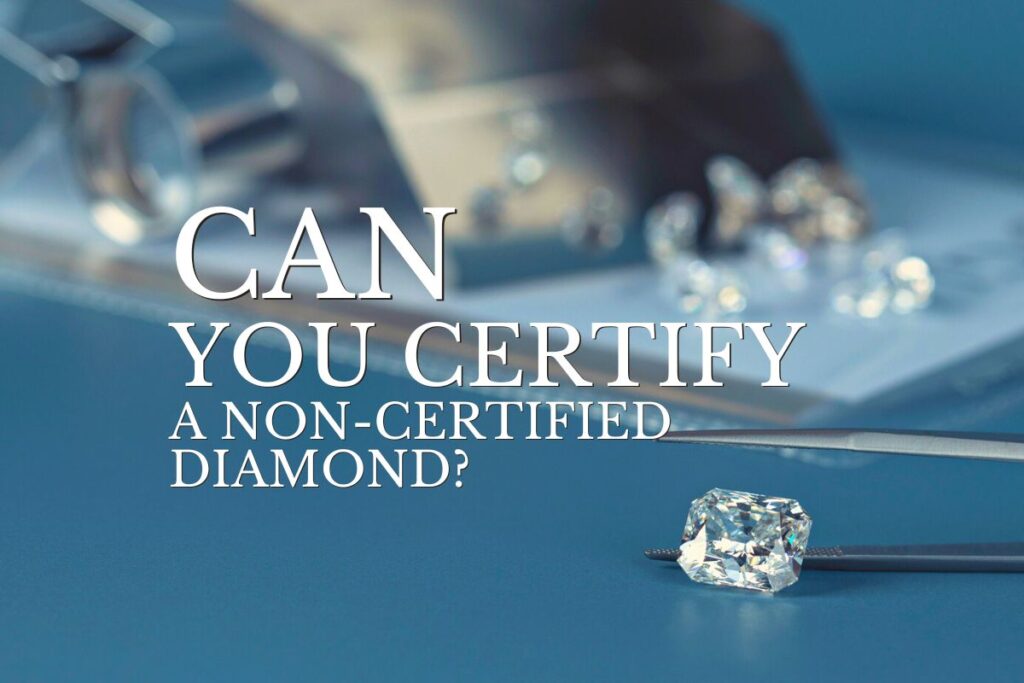Diamond certification is the process of evaluating the diamond based on the four common characteristics that we use to judge their value, cut, color, carat, and clarity. Many people use this certification to ensure they are getting their money’s worth or for reselling purposes. But many people wonder how to even start the certification process.
You can certify a non-certified diamond by sending the diamond to the appropriate parties to have it evaluated. While non-certified diamonds are not always poor quality, getting a diamond certified is a good idea to better ensure its quality and value.
Let’s talk more about certifying diamonds and why it is important.
Who Can Certify a Non-Certified Diamond?

Only gemological labs can certify diamonds as they have no bias regarding the diamond itself. Going to a jeweler for certification is impossible as they do not have the authority to certify a diamond. A jeweler can only estimate the worth of a diamond they did not make based on how it looks to them. If they did make the diamond, they have a bias regarding its value.
So, the only true way to get an unbiased diamond certification is to use an independent lab. These labs are not directly involved in the selling, buying, or distributing of diamonds. Therefore, they do not have a bias regarding any diamonds that come their way for certification.
How To Recognize a True Certified Diamond

One problem that potential buyers run into when shopping for a diamond is that they have trouble distinguishing between real diamond certifications. It is important to know that jewelers cannot officially certify a diamond on their own. Instead, they must use an outside, independent lab to genuinely certify a diamond.
So, if you ask about diamond certification and they have an in-house certification team, this is not legitimate. This does not automatically mean that the company is shady, but it is worth considering why they do not use official certification channels.
The main thing you need to look for in true diamond certification is the GIA or the AGS. The GIA, or the Gemological Institute of America, is the main source of certification. They are widespread, respected, and well-known in the diamond industry. Getting a certification from the GIA is the best way to ensure legitimacy.
Alternatively, the AGS or the American Gem Society also has a reputable ability to certify diamonds. It is newer than the GIA but has been around since the 1990s. Either company will be able to accurately certify a diamond without bias as they have nothing to gain from reporting that information.
Reasons To Certify a Diamond

Now that we know who can certify a diamond, let’s talk about why it is important. Just because a jeweler does not offer a GIA certification for their diamond does not automatically mean they are trying to hide something. Still, it is always best to check the quality.
Back-Up Seller Claims
Whether you are buying a diamond from a reputable jeweler or a third party seller online, it is important to know what you are getting. Unfortunately, there are many ways to hide the true value of a diamond. Of course, this can spell disaster for the longevity of the diamond and the value of reselling it in the future.
If you want to make sure that you are getting exactly the quality and cut you are paying for, certification can help you do just that. When purchasing a diamond, you have to be careful not to always take the seller’s word regarding the worth of the piece. So, certifying the diamond through an independent third party can help ensure you are getting the diamond you are paying for.
Reselling
If you plan to sell a diamond that you previously purchased because it no longer fits or you need the money, certification can help show potential buyers the ring’s true value. It can help your buyer be more confident in the sale and help you get the best possible price for it.
Not every diamond comes with certification when you purchase it. Thankfully, sending the diamond to an independent lab can help you get certification even years after you purchased it. Consider doing this when reselling jewelry to help the selling process go as smoothly as possible.
Insurance
When purchasing a valuable diamond, it is always best to insure it. Getting a diamond certified can help with the insurance process as it shows the insurance company the exact worth of the diamond. This makes it a lot more likely that they will compensate you the true value of your diamond should anything happen to it while covered under insurance.
With certification, there is no doubt about how valuable the diamond is. Rather the insurance company has something concrete to work with while processing your claim. It can help ease the coverage process while ensuring that you get the full value in return if necessary.
Is a Non-Certified Diamond Worth Less Than Certified?

While diamond certification can help you better determine the worth of a diamond, non-certified diamonds are not automatically worth less than certified diamonds. A non-certified diamond can still be of great quality.
It is important to know that diamond certification doesn’t change anything about the diamond itself. Instead, it reveals the true value of the piece. Essentially, your non-certified diamond may be of great quality, but you won’t be able to prove that without certification.
Not every diamond needs certification. In fact, many people purchase and sell diamonds without troubling themselves with the process. However, it can help ease the risk of purchasing a diamond if you know exactly what it is worth from an unbiased third party. While non-certified diamonds are not worth less, they are riskier to purchase than certified ones.
Final Thoughts
You can certify a non-certified diamond by sending it to a third-party, unbiased gemological lab for evaluation. This is common when buying or selling diamonds that are worth a significant amount of money, as it acts like a certificate of authenticity.
We highly recommend certifying a diamond before making a major purchase or selling it, so you get the best possible value for it. While it is unnecessary, it benefits all involved in the sale.
If you found this article useful, make sure you save this pin below to your Jewelry board.


